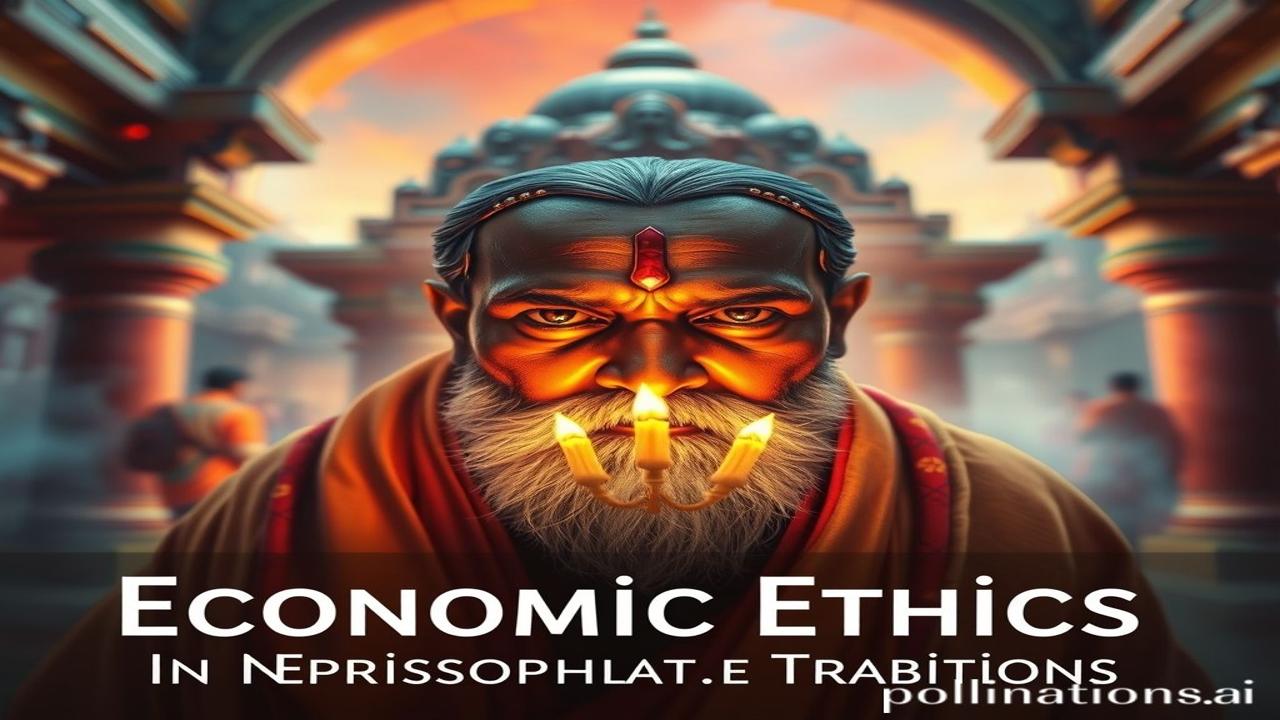“Rupaye ki Atma”: Exploring Economic Ethics in Ancient Indian Wisdom
Kabhi socha hai ki, jo sikka aapki jeb mein baj raha hai, uski bhi koi atma ho sakti hai? Maybe not literally atma, but the neeti (ethics) behind how we earn, spend, and share wealth, is something ancient India thought deeply about. Waqt ki dhool mein chhupi ye kahaniyan, aaj bhi humare jeevan ko prabhavit karti hain. Let’s delve into this fascinating world!
Bharat ki Dharmik Dharohar aur Arthashastra
What is Economic Ethics in Indian Philosophy?
Economic ethics in Indian philosophy isn’t just about making money; it’s about dharma (righteousness) in artha (wealth). It explores how we acquire wealth, how we use it, and its impact on society and the individual. It’s deeply intertwined with concepts like karma, moksha (liberation), and dana (charity).
Where and When Did it All Begin?
This isn’t a modern invention. Humare Vedas, Upanishads, Arthashastra, and even Buddhist and Jain texts are overflowing with insights into economic ethics. Think around 3000 BCE onwards! This philosophy flourished across ancient India, from the Indus Valley civilization to the Mauryan Empire.
Why is it Still Relevant Today?
In today’s hyper-consumerist world, where the pursuit of wealth often overshadows everything else, these ancient principles offer a much-needed ethical compass. They remind us that true prosperity isn’t just about filling our wallets, but also about enriching our lives and communities. It’s about finding santulan (balance).
Zamini Sach: People and Life in Ancient India
Imagine a bustling marketplace in ancient Taxila (Takshashila). A merchant, let’s call him Dhananjaya, is haggling over the price of silk with a farmer. Dhananjaya believes in satya (truthfulness) and nyaya (justice). He won’t cheat the farmer, even if it means a smaller profit.
“Bhai, main tumhe sahi daam dunga,” he says to the farmer, wiping sweat from his brow. “Yeh vastra tumhare mehnat ka phal hai, aur main iska samman karta hoon.”
Meanwhile, King Ashoka is implementing policies based on dharma. He builds wells and rest houses for travelers, ensuring that everyone has access to basic necessities. He understood that a prosperous kingdom is one where everyone flourishes, not just the elite.
A farmer, Somadeva, returns home after a long day in the fields. He remembers the teachings of his Guru, who emphasized the importance of aparigraha (non-possessiveness). He shares his meager meal with a wandering sadhu, understanding that true happiness lies in giving, not hoarding.
Dharohar aur Pehchan: Cultural Significance Today
We see echoes of these ancient economic ethics in various aspects of Indian culture even today.
- Dana (Charity): The tradition of giving to the needy is deeply ingrained in Indian culture. From temple donations to community kitchens (langars), dana continues to be a significant expression of economic ethics.
- Trusteeship: Gandhiji championed the concept of trusteeship, drawing inspiration from ancient Indian ideals. He believed that the wealthy should act as trustees of their wealth, using it for the benefit of society.
- Festivals: Festivals like Diwali, where Lakshmi, the goddess of wealth, is worshipped, remind us of the importance of prosperity, but also the responsibility that comes with it.
These practices connect us to our Bharatiyata (Indianness) and provide a framework for a more just and equitable society.
Mazedar Tathya ya Bhram-Bhanjak: Fact or Fiction?
Log samajhte hain ki Arthashastra sirf rajneeti (politics) aur prashasan (administration) ke bare mein hai. Lekin asli sach yeh hai ki Arthashastra economic ethics aur samajik kalyan (social welfare) par bhi utna hi zor deta hai! Kautilya, the author, was not just a strategist; he was also a moral philosopher deeply concerned with the well-being of his people.
Drishya aur Bhavnayen: Visual & Sensory Layer
Imagine the scent of incense wafting through the air as people offer prayers for prosperity at a temple. The rhythmic chanting of mantras echoes through the streets. The coarse texture of handspun cotton clothing against the skin. The taste of simple, nourishing food shared with family and community. These sensory experiences were integral to the daily lives of people who lived by these principles.
Antim Vichar ya Uddharan: Closing Insight or Quote
The true measure of wealth isn’t how much we accumulate, but how much we contribute. As the ancient saying goes:
” सर्वे भवन्तु सुखिनः सर्वे सन्तु निरामयाः,
सर्वे भद्राणि पश्यन्तु मा कश्चिद् दुःखभाग्भवेत् ॥”
(May all be happy, may all be free from illness, may all see what is auspicious, may no one be subject to misery.)
Let’s strive to embody this wisdom in our economic choices, creating a world where prosperity is shared by all.
